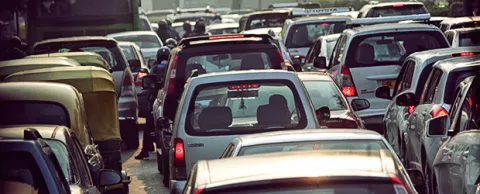
The U.S. Department of Transportation says it was blown away by the submissions to its Smart City Challenge, a program that will provide up to $50 million to help improve traffic flow in one mid-size city and generate innovative ideas and results that can help everyone else.
The DOT says 77 cities have submitted plans. Some 300 companies have expressed interest in helping.
“The country is tired of being stuck in neutral,” Transportation Secretary Anthony Foxx told CNET Roadshow. “We're in an age where the intersection of transport and tech is ever present, and yet because of funding constraints and a lack of vision, we haven't been able to capitalize."
Five finalists will be announced at the South by Southwest festival next month. Each will receive $100,000 to fine tune its proposal. The winning city, which will be announced in June, will receive up to $50 million to implement its plan.
The competition was limited to mid-size cities — from San Francisco and Boston to Greenville, South Carolina and Canton, Ohio — in an effort to drive the biggest impact from the investment. The DOT was looking for cities that are small enough to make a difference quickly, but large enough so their results would be meaningful for others.
Here are a few of the submissions.
Flipping single-driver statistics
New Haven, Connecticut, proposes to complete flip the number of people who drive to work alone. Right now, about 70% of commuters are solo drivers; it wants to flip that figure to 30%. With more people moving downtown, it says there just isn’t room for all the cars.
It’s trying to make buses more attractive to commuters. It's installing GPS on each bus now so that transit riders will be able to see where their bus is and exactly when it will arrive.
It's also looking at turning certain downtown streets into one-way roads to improve traffic flow. And it's exploring a bike share program.
Focus on smart transportation systems
Louisville, Kentucky, wants to use the funding to deploy smart technology to help its traffic flow. One major piece of that plan is to boost connectivity throughout the county.
To that, it wants to add smart traffic signals, as well as additional sensors to monitor and report on traffic conditions. The idea is to give commuters more information so they can make better real-time decisions.
Meanwhile, Las Vegas wants to turn its downtown corridor into a smart transportation lab. The city's population swells dramatically during major conventions and it wants to use the prize money to study various ways of moving those attendees around — results, it says, that would help other cities.
Coordinated traffic planning
Buffalo, New York, wants to bring several different transit agencies together to develop a data-driven, coordinated transportation plan that helps traffic in the broader community.
The Niagara International Transportation Technology Coalition, city of Buffalo, Greater Buffalo-Niagara Regional Transportation Council and the Niagara Frontier Transportation Authority all worked together on the proposal.
Under the plan, each agency would install more sensors to monitor their traffic, but the data would be shared with all the others so they could work together on coordinated traffic solutions.
More stories …
Brussels relinquishes "worst traffic" title; see how it’s doing it
How to get your citizens to work on time (your traffic analytics are letting you down)
3 traffic myths that just won't die (ignore them at your city's peril)



